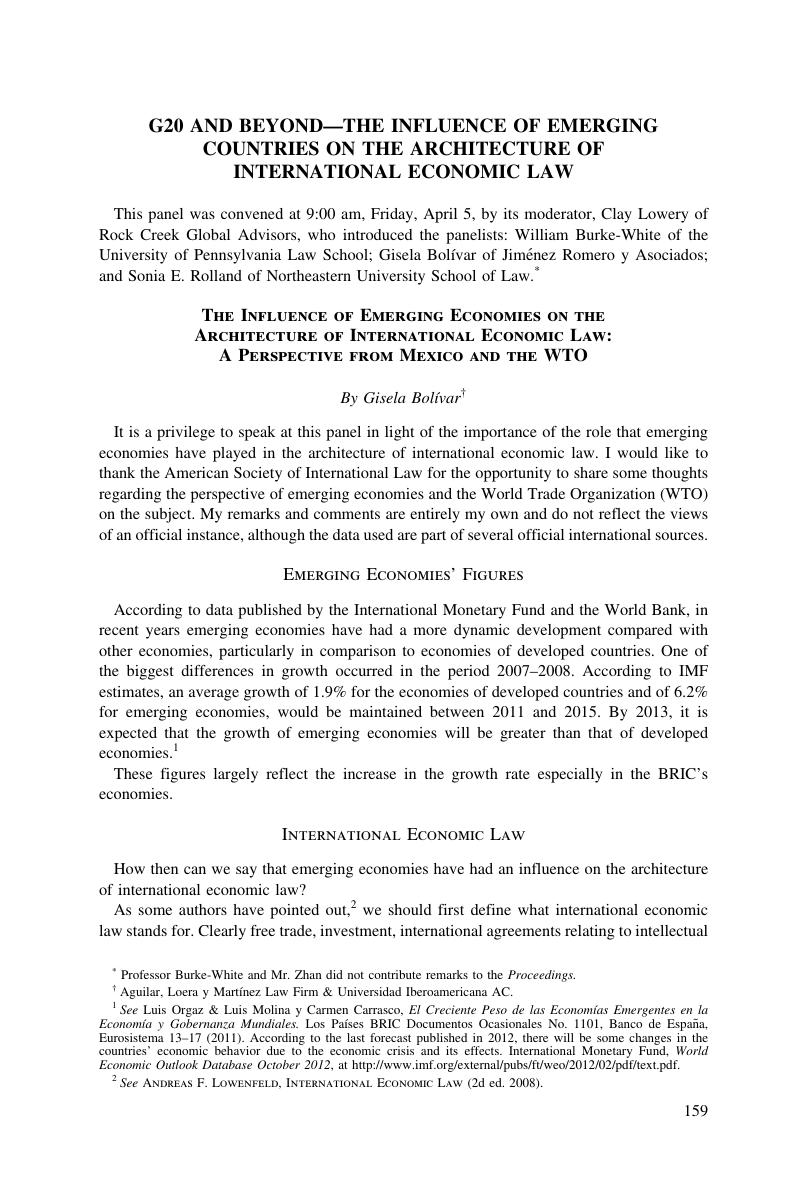No CrossRef data available.
Article contents
The Influence of Emerging Economies on the Architecture of International Economic Law: A Perspective from Mexico and the WTO
Published online by Cambridge University Press: 20 January 2017
Abstract

- Type
- G20 and Beyond—The Influence of Emerging Countries on the Architecture of International Economic Law
- Information
- Copyright
- Copyright © American Society of International Law 2014
References
* Professor Burke-White and Mr. Zhan did not contribute remarks to the Proceedings.
1 See Luis Orgaz & Luis Molina y Carmen Carrasco, El Creciente Peso de las Economías Emergentes en la Economía y Gobernanza Mundiales. Los Países BRIC Documentos Ocasionales No. 1101, Banco de España, Eurosistema 13–17 (2011). According to the last forecast published in 2012, there will be some changes in the countries’ economic behavior due to the economic crisis and its effects. International Monetary Fund, World Economic Outlook Database October 2012, at http://www.imf.org/external/pubs/ft/weo/2012/02/pdf/text.pdf.
2 See Andreas F. Lowenfeld, International Economic Law (2d ed. 2008).
3 See Secretaría de Economía, Tratados y Acuerdos firmados por México, at http://www.economia.gob.mx/comunidad-negocios/comercio-exterior/tlc-acuerdos.
4 See Decreto de Facilidades Administrativas en Materia Aduanera de Comercio Exterior, Official Mexican Gazette, Mar. 31, 2008.
5 See Dominican Republic—Safeguard Measures on Imports of Polypropylene Bags and Tubular Fabric (Summary of Key Findings), Disputes DS415, DS416, DS417, DS418, available at http://wto.org/english/tratop_e/dispu_e/cases_e/ds415_e.htm; http://wto.org/english/tratop_e/dispu_e/cases_e/ds416_e.htm; http://wto.org/english/tratop_e/dispu_e/cases_e/ds417_e.htm; http://wto.org/english/tratop_e/dispu_e/cases_e/ds418_e.htm.
6 See United States—Measures Affecting Trade in Large Civil Aircraft, Second Complaint, (Summary of Key Findings), Dispute DS353, available at http://wto.org/english/tratop_e/dispu_e/cases_e/ds353_e.htm.
7 United States—Measures Concerning the Importation, Marketing and Sale of Tuna and Tuna Products (Summary of Key Findings), Dispute DS381, available at http://wto.org/english/tratop_e/dispu_e/cases_e/ds381_e.htm.
8 Bown, Chad, Participation in WTO Dispute Settlement: Complainants, Interested Parties and Free Riders, 19 World Bank Econ. Rev. 287, 310 (2005)CrossRefGoogle Scholar.
9 Busch, Marc L. & Reinhardt, Eric, Bargaining in the Shadow of the Law: Early Settlement in GATT/WTO Disputes, 24 Fordham Int’l L.J. 158, 164–65 (2001)Google Scholar.
10 See Dominican Republic—Safeguard Measures, Implementation of Adopted Reports, n.5.
11 See United States—Measures Affecting Trade in Large Civil Aircraft, Compliance Proceedings, n.6.
12 See United States—Measures Concerning the Importation, Marketing and Sale of Tuna and Tuna Products, Reasonable Period of Time Dispute, n.7.
13 Twenty-first century issues include the financial sector, environmental problems, and e-commerce, among others. See Interview with Professor John Jackson on the WTO’s Dispute Settleement System, http://www.wto.org/english/forums_e/debates_e/debate41_e.htm.


